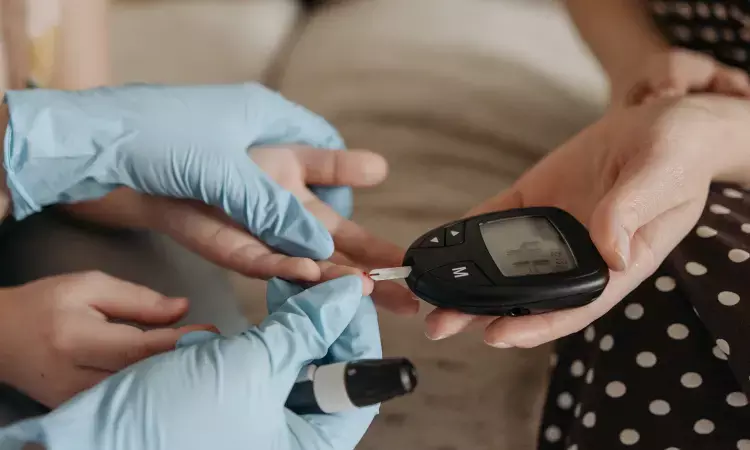- Home
- Medical news & Guidelines
- Anesthesiology
- Cardiology and CTVS
- Critical Care
- Dentistry
- Dermatology
- Diabetes and Endocrinology
- ENT
- Gastroenterology
- Medicine
- Nephrology
- Neurology
- Obstretics-Gynaecology
- Oncology
- Ophthalmology
- Orthopaedics
- Pediatrics-Neonatology
- Psychiatry
- Pulmonology
- Radiology
- Surgery
- Urology
- Laboratory Medicine
- Diet
- Nursing
- Paramedical
- Physiotherapy
- Health news
- Fact Check
- Bone Health Fact Check
- Brain Health Fact Check
- Cancer Related Fact Check
- Child Care Fact Check
- Dental and oral health fact check
- Diabetes and metabolic health fact check
- Diet and Nutrition Fact Check
- Eye and ENT Care Fact Check
- Fitness fact check
- Gut health fact check
- Heart health fact check
- Kidney health fact check
- Medical education fact check
- Men's health fact check
- Respiratory fact check
- Skin and hair care fact check
- Vaccine and Immunization fact check
- Women's health fact check
- AYUSH
- State News
- Andaman and Nicobar Islands
- Andhra Pradesh
- Arunachal Pradesh
- Assam
- Bihar
- Chandigarh
- Chattisgarh
- Dadra and Nagar Haveli
- Daman and Diu
- Delhi
- Goa
- Gujarat
- Haryana
- Himachal Pradesh
- Jammu & Kashmir
- Jharkhand
- Karnataka
- Kerala
- Ladakh
- Lakshadweep
- Madhya Pradesh
- Maharashtra
- Manipur
- Meghalaya
- Mizoram
- Nagaland
- Odisha
- Puducherry
- Punjab
- Rajasthan
- Sikkim
- Tamil Nadu
- Telangana
- Tripura
- Uttar Pradesh
- Uttrakhand
- West Bengal
- Medical Education
- Industry
Men prone to more severe diabetic foot ulcers disease compared to women

Belgium: The researchers from Health Services Research and University Hospital Antwerp, Belgium, in their study, have concluded that compared to women, the severity of diabetic foot ulcer (DFU) is more in men. The main possible contributing factor here is smoking status in men tied to the worse vascular state.
The findings of the study are published in Plos One.
DFU, with an annual incidence of 0.2 to 11 %, are longstanding diabetes complications associated strongly with peripheral arterial disease, neuropathy and foot deformity.
19 to 34% of people with diabetes develop DFU. The condition has morbidity and risk of lower limb amputation, severely impacting the patient’s quality of life and increasing the burden and cost to the health care system.
Sex strongly influences foot care behaviours, and there lies a difference in how men and women care for themselves and manage diabetes to prevent such complications. There should be a better understanding in a sex-specific manner.
Considering this, researchers identified sex differences in co-morbidities, referral pattern, ulcer severity, and outcome DFU patients treated in Belgian multidisciplinary diabetic foot clinics.
They included 1,771 patients with moderate to severe DFU and used the Generalized Estimating Equation model and Cox proportional hazards regression models.
The study summary includes the following:
- There were 72 % of male patients in the study.
- Men have deeper ulcers that probe to bone and are infected deeply.
- Most men have previous lower limb revascularization, while women have renal insufficiency.
- Smoking is more common in men than women.
- No differences in presentation delay were reported.
- Women have a 26% higher chance of healing than men without major amputation, and the hazard ratio is 1.258.
The study’s strength includes “real-world” observations.
The limitations are the study included only moderate to severe DFU; no data was recorded on BMI, glycated hemoglobin, lipid status, socio-economic status and lifestyle profile.
Concluding further, females have higher chances of ulcer healing.
Sex is an important determining factor to be considered in preventive and therapeutic strategies for managing DFU.
Further reading:
Vanherwegen AS, Lauwers P, Lavens A, Doggen K, Dirinck E; Initiative for Quality Improvement and Epidemiology in multidisciplinary Diabetic Foot Clinics (IQED-Foot) Study Group. Sex differences in diabetic foot ulcer severity and outcome in Belgium. PLoS One. 2023 Feb 16;18(2):e0281886. doi: 10.1371/journal.pone.0281886.
BDS, MDS in Periodontics and Implantology
Dr. Aditi Yadav is a BDS, MDS in Periodontics and Implantology. She has a clinical experience of 5 years as a laser dental surgeon. She also has a Diploma in clinical research and pharmacovigilance and is a Certified data scientist. She is currently working as a content developer in e-health services. Dr. Yadav has a keen interest in Medical Journalism and is actively involved in Medical Research writing.
Dr Kamal Kant Kohli-MBBS, DTCD- a chest specialist with more than 30 years of practice and a flair for writing clinical articles, Dr Kamal Kant Kohli joined Medical Dialogues as a Chief Editor of Medical News. Besides writing articles, as an editor, he proofreads and verifies all the medical content published on Medical Dialogues including those coming from journals, studies,medical conferences,guidelines etc. Email: drkohli@medicaldialogues.in. Contact no. 011-43720751


